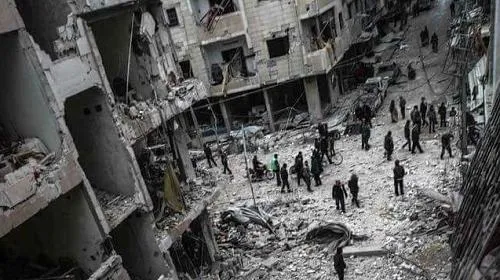BEIRUT, Lebanon (March 2, 2018) — Airstrikes and shelling in eastern Ghouta have prevented humanitarian aid from entering the besieged enclave and medical evacuations from leaving, according to a group of international humanitarian organizations, including CARE. This comes five days after the UN Security Council adopted a resolution demanding an immediate nationwide cessation of hostilities.
Inter-agency aid convoys are ready to go to 10 besieged and hard-to-reach locations, according to the United Nations. They include a 45-truck convoy with aid for 90,000 people to Douma in eastern Ghouta. The bombing and fighting are preventing these trucks from delivering lifesaving aid.
“The unwillingness of permanent members of the UN Security Council to use their influence to ensure the implementation of this cessation of hostilities is shameful,” said David Miliband, president and CEO of the International Rescue Committee. “Unless the Security Council’s demands are swiftly translated into action, eastern Ghouta will remain hell on earth for hundreds of thousands of civilians.”
UN Security Council Resolution 2401, passed on Feb. 24, demands a “durable humanitarian pause for at least 30 consecutive days throughout Syria, to enable the safe, unimpeded and sustained delivery of humanitarian aid and services and medical evacuations of the critically sick and wounded.” UN emergency relief coordinator Mark Lowcock briefed the Security Council yesterday, asking, “Has Security Council Resolution 2401 been implemented? Is there a ceasefire in Syira? No. And no,” he said.
Almost 400,000 people are trapped and facing acute hunger in eastern Ghouta. Humanitarian aid deliveries into besieged eastern Ghouta have been severely curtailed in recent years, with only one convoy having reached the area since November 2017. Some local organisations have managed to deliver some aid that was already stocked in eastern Ghouta, but those deliveries do not meet the scope of need.
“Our partners have managed to distribute 15kg (33 lbs) of flour per family, to about 2,000 families, during the short hours of respite in fighting in the past few days,” said Wouter Schaap, CARE’s country director in Syria. “But this aid comes from pre-positioned stock and is not enough to start alleviating the huge needs. We need to be able to support our partners to get more food and other relief items to people in need.”
On Monday, Russian President Vladimir Putin ordered a daily five-hour pause in the Syrian government’s assault on eastern Ghouta and the creation of a “humanitarian corridor” that would allow civilians to leave. The International Committee of the Red Cross (ICRC) said on Tuesday that it is ready to deliver lifesaving aid to Ghouta but that it is “impossible” to bring in a humanitarian convoy in five hours, and residents in eastern Ghouta have reported continued shelling since this announcement.
While UN Security Council Resolution 2401 affirms that military operations against the Islamic State, Al Qaeda, Al Nusra Front and other groups designated by the Council as terrorist groups can continue, the resolution also demands that all parties comply with their legal obligations under international law, including the protection of civilians. On Tuesday, civil groups and armed opposition groups in Ghouta wrote a letter to the UN Security Council stating they are committed to deporting designated terrorist groups out of eastern Ghouta if a real ceasefire provides the conditions for this to happen.
“We need a real and actual cessation of hostilities to allow aid to reach civilians and provide hope for a more durable solution,” said Susannah Sirkin, director of International Policy and Partnerships at Physicians for Human Rights. “Resolution 2401 can still save lives. For the sake of humanity, we call on Russia to use its influence to translate the Security Council’s demands into immediate action.”
About CARE
Founded in 1945 with the creation of the CARE Package®, CARE is a leading humanitarian organization fighting global poverty. CARE places special focus on working alongside women and girls because, equipped with the proper resources, they have the power to lift whole families and entire communities out of poverty. That’s why women and girls are at the heart of CARE’s community-based efforts to improve education and health, create economic opportunity, respond to emergencies and confront hunger. Last year CARE worked in 93 countries and reached 63 million people around the world. Learn more at care.org.
Media Contact
Nicole Harris, nharris@care.org, 404-735-0871

